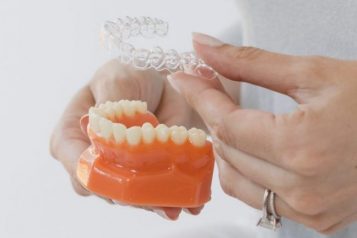An internationally-known double-board certified facial plastic surgeon, Dr. P. Daniel Ward has addressed the aesthetic concerns of thousands of patients helping them restore and improve their self-confidence and self-esteem. Distinguished by attention to detail, a down-to-Earth approach, and a passion for his work, Dr. Ward is recognized as a top facial plastic surgeon around the world. Dr. Ward’s extensive educational credentials include a five-year residency in Otolaryngology-Head & Neck Surgery followed by completion of a Facial Plastic Surgery Fellowship. Haute Beauty chats with Dr. Ward to discuss the reasons why he would not operate on a patient.
 Photo Credit: Shutterstock
Photo Credit: Shutterstock
There are many reasons that a patient may not be a candidate for surgery. Some of these are medically related whereas others may be due to issues that are less well defined. The way that I often think about this issue is in terms of positives and negatives. If the positives that we expect from doing the surgery outweigh the negatives, then we can consider proceeding. However, if the negatives have too high of a risk of outweighing the positives of the procedure, then we would not proceed. I think that every surgeon has patients that they, in hindsight, wish they would or could have avoided operating on.
There is an old saying in surgery, “you never regret the patients on whom you did not operate.” The key is finding out who is a good candidate and who is not. For most surgeons, this is a many years process that starts as a medical student and continues through internship, residency, fellowship, and into practice. I don’t know if we ever fully get this figured out, because we, as humans, are so complex.
1. Medical issues
For medical issues, if the patient has some sort of medical condition that makes the surgery risky, we obviously will not proceed with the surgery. For example, if someone has a history of heart disease and wants a facelift, we may not want to proceed with the procedure, because we do not want them to have a heart attack during the procedure. I always tell my patients that our goal is to make their life better with the surgery and if they have some sort of complication that we could have prevented, we have not achieved that primary goal.
Some medical issues that are common that may make us not want to proceed with surgery are things like hypertension or diabetes. Hypertension can lead to excessive bleeding, bruising, and swelling. For some procedures, such as blepharoplasty, it may even lead to serious complications that could affect vision. Having blood pressure under good control prior to surgery is a necessity and I encourage all my patients with high blood pressure to see their family doctor or internal medicine doctor prior to surgery in order to optimize them medically.
Diabetes is an issue that can cause multiple complications. The most common issue in plastic surgery would be related to wound healing. Having an elevated blood glucose level that process can be associated with several difficulties in the postoperative period. For example, healing can be prolonged, scarring can be worse, and the overall result can be less than ideal.
 Photo Credit: Shutterstock
Photo Credit: Shutterstock
2. Smoking, drug use, substance abuse
Smoking, drug use, substance abuse, etc. are other obvious reasons to avoid surgery. These can all affect the experience of the patient in the operating room and can make that procedure unsafe. In addition, smoking, whether it is tobacco or marijuana, can affect wound healing and lead to worse scars, prolonged healing, and an overall poor result.
3. Mental and emotional instability
Other, non-medical issues that we sometimes see that would make us desire to avoid surgery can include mental health issues or simply a patient who has expectations that are not in line with what we can realistically achieve. Mental health issues can range from something that is serious to something that is less serious but can tremendously affect the patient’s satisfaction with the result. For example, untreated schizophrenia, bipolar disorder, major depression, major anxiety would all be in the category of conditions that would preclude them from being a good candidate for surgery. Other mental and emotional issues could include personality disorders, such as histrionic, borderline, narcissistic, obsessive-compulsive, etc. disorders. These conditions can make communication between the physician and the patient more difficult and can set up a relationship between the patient, the physician, and other members of the care team that may not be healthy. Prior to operating on patients with these disorders or even patients with these tendencies, we have these patients see a psychiatrist to ensure that their treatment is optimized and to also help provide a resource that can be an independent resource for the patient.
4. Unrealistic expectations & difficult personality traits
Finally, the most common area is in patients who are healthy medically and mentally, but they may have expectations or other personality traits that may cause difficulties. I, probably like all surgeons, operate because I want to make my patients happy. I want to relieve the problem that is bothering them. Sometimes, however, a patient’s expectations may not be realistic. This issue can arise from both the surgeon as well as the patient. As the surgeon, explaining complicated medical procedures with the accompanying postoperative care and risk of complications might be difficult. Sometimes, I think that we have had this medical knowledge ingrained so deeply into our beings as surgeons, that we make assumptions about what patients may know. This can obviously cause difficulties if we assume that a patient is aware of an issue, but they are not actually.
The patient may not know what questions to ask and might be so excited about the potential for improving an area that they may not understand or even think of some of the side effects that can occur. These side effects could be things such as complications, but they could also be issues that are simply part of the procedure. For example, the patient may be so excited about tightening their saggy neck and jowls that they do not even think about the scar. To the surgeon, the presence of a scar is such a basic element of the procedure that they may forget to mention this issue to the patient. The patient may be unhappy in the post-operative course due to the presence of the scars, especially if they are red or prominent during the healing process. This is perhaps an overly simplistic example, but it illustrates the issue well.
Prime examples
As surgeons, we all have patients who are occasionally unhappy with their results. For example, I had a facelift patient who had a result that was absolutely stunning. The degree of improvement was remarkable, and I was very pleased with the result. However, the patient was quite upset, because some of the fine lines of the skin–lines that as a surgeon I know are never removed with a facelift–were still present. I am confident that this issue was explained to the patient before surgery by me verbally as well as in our written materials that we provide to all patients before surgery. However, this patient was upset to the point that she went to see another surgeon because she did not feel confident in my answers in the postoperative period.
Another similar patient was a rhinoplasty patient. She had a dramatic improvement in her nose, and I was very pleased with the result. There were some minor issues associated with scar tissue that made a result that was not to the level that I would have hoped to achieve, but it was still a very good result. This patient was terribly unhappy. She had no mental health or medical conditions that would have contributed to this issue on the surface. However, in the postoperative period, she casually mentioned that she had “even had to increase my antidepressant dose” as a result of the stress caused by worrying about her nose. In my opinion, she made the problem worse by seeking out other surgeons who were more than happy to recommend further surgery to this patient. She elected to proceed with surgery with another surgeon.
Both of these experiences help illustrate the issues that can happen. Another frequently cited surgical pearl of wisdom, which is humorous, although somewhat cynical, encapsulates many of the issues mentioned above. The quote states that “after plastic surgery, a patient’s vision always improves, and their memory always gets worse.” The point of this humorous statement is that a patient’s “eyesight improves” meaning that they notice things that they didn’t notice before and “their memory gets worse,” because they don’t remember things that were told to them before surgery. Although this is a common joke within the plastic surgery world, I think it is important to keep in mind. I feel that our job as surgeons is to educate before and after surgery, to perform the surgery to the best of our abilities, and, most importantly, to have empathy for our patients. In my experience, these factors result in the greatest opportunity for patient and surgeon satisfaction.
For more information, visit Dr. Brian A. Levine's social media:

























